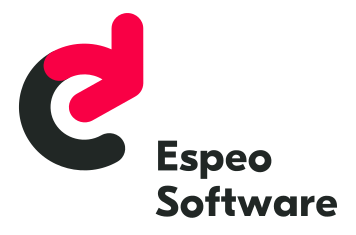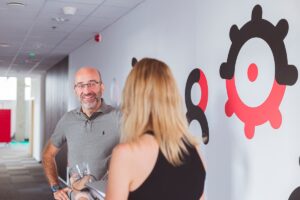So much of software development involves hard science and math. However, effective software development is a group effort that takes some emotional intelligence. In the current climate, there’s real power in development teams that place communication, negotiation and leadership on the same level as technical skills. Plenty of developers can write clean code in several coding languages. But how many can motivate their peers, or reassure clients abroad? Intercultural communication, for example, is as vital to developers as coding in our view. Modern developers have to take on the role of technical consultants who deliver features, but also explain why it’s the best choice in a compelling way.
Espeo is not the only one that values soft skills as much as hard skills. Social networking site Linkedin listed the most in-demand soft skills for a changing global economy. Collaboration and time management are among the most important skills according to the survey. We believe that these hold equal weight in our software delivery. No matter how much technical skill a development team has, delivering the best version of a product requires a strong workplace culture. In this post, I’ll share a few of our company’s values and unpack why we believe these five soft skills are so important. I’ll look at the skills we value the most and explain why well-rounded developers deliver better results.
Effective client-focused communication
Tech expertise is only part of the equation when it comes to software delivery. Effective client communication is one of the software developer soft skills that we value in our process. We’ve found that clients don’t just want a team to follow directions to the letter and stop there. Clients want ideas. They want experts that think critically to suggest the best solution to a given challenge. Of course, programming knowledge is a must, but so is straight talk. If there’s a better way to solve a challenge, one of our developers will tell you.
Tomasz Liberski, our delivery director says there are some misconceptions about developers from Central and Eastern Europe. There’s a stigma about a lack the creativity or a lack of language skills to fully engage with clients and suggest solutions. Liberski disagrees. He drives his team to expand their technical knowledge and advisory skills. Knowing more than one programming language doesn’t mean anything if you can’t effectively communicate solutions.
“Effective client-focused communication is something we seek out when we recruit, but also something we encourage developers to constantly improve,” said Liberski.
Through regular, honest feedback, our team strives to optimize our process. One of the ways we encourage the team to improve client communication is simply through practice. With every client, developers work to gain a full picture of the client’s needs. Once they get the full picture, the team can refine the scope and suggest ideas. The more projects developers have under their belts, the better they get at client communication. In turn, this only improves the quality of the final product, delivering real value to end-users. In any development project, having a team with technical capabilities is important, but working with solid development partners is far more useful.
How we do it:
- Organize teams of developers into creative teams with weekly or bi-weekly meetings with clients. The team gets familiar with all the aspects of the client’s business to fully understand client needs.
- Regular feedback from clients and peers creates an atmosphere of transparency encouraging the team to suggest the best ways to solve a business challenge.
Leadership and community engagement
Software development is no easy task. It’s one that takes initiative and good leadership to motivate teams. As consultants and technical specialists, Espeo developers are constantly learning and sharing knowledge.
Leadership skills are also something we look for as much as coding skills. Good leaders not only motivate the internal team but also ensure proper delivery to clients. Motivated teams work more efficiently and there’s less employee turnover — leading to more stability. Just as effective client communication is a vital soft skill for software developers, leadership is as well.
In our teams, there’s a project manager and a scrum master — two separate roles. This separation gave better results because both should focus on different aspects of a development project. A project manager’s role is to keep the project down to earth while scrum masters clear any blockers and keep the team on schedule.
In terms of community engagement, developers regularly lead technology workshops which are both opportunities to attract new talent but also share knowledge with our local community. These initiatives increase the visibility of our developers while also helping others learn new skills.
How we do it:
- Organize events for developers to engage the community, share knowledge, and build up their confidence as leaders.
- Work together in self-organizing teams where leaders give and receive regular feedback on how to improve.
Team Cooperation
Team cooperation is one of our core values. This, of course, is important for any company but software agencies especially. Organizing all the moving parts of a development project is a team effort — one that requires developers to work together. We make sure that everyone who joins is actually passionate about working in a team and is not a lone wolf. But apart from working together, developers also need to be transparent and willing to jump in to help ensure the team finishes a project on time.
We hold constant workshops and devote a lot of time for strengthening communication skills in delivery. Ultimately what this leads to is the communication of the whole team not only the project manager with the client or the product owner. This boosts trust and also leads to more feedback. More feedback increases motivation because developers can see the benefits of their work and can talk about them face-to-face with the team and the client.
In addition to building team cohesion, the skill of team cooperation creates an atmosphere of confidence and transparency. Developers are able to recognize weak points in a process and suggest actionable ways to fix them. Getting as much feedback about ways to improve only improves the quality of the products we create for our clients.
How we do it:
- Boost trust through open communication channels and set aside time to foster team cooperation.
- Welcome suggestions on how to improve the quality of our process.
Initiative
It’s as important to be independent as part of a team. Self-organizing teams are the ideal, but setting up an environment for team members to take initiative and take on responsibility is an essential part of software development in our view. Independence is a vital soft skill here. But aside from simply taking on a narrow view of the project and doing one small part, helping others reach self-organization is an important process.
Encouraging the team to think independently and then to actually come up with strategies to implement ideas is one of our core strategies. This culture of openness and constant improvement ultimately delivers value to the clients since we work with others who love what they do and really work toward improving their own skills.
Part of this initiative involves leading internal workshops and training sessions. During these events, developers share the knowledge they’ve gained with others, improving the skills of the whole team. Our core value is to share knowledge and build up the team’s expertise. This, of course, builds up team cohesion and increases productivity. Having a solid team where this type of knowledge sharing is encouraged helps keep the team creative and willing to suggest the best solutions to whatever challenges our clients throw at us.
How we do it:
- We surround ourselves with experts who love what they do and are eager to share what they know.
- We set aside time to prepare internal workshops and training sessions.
Personal development
Finally, our fifth most important skill on our list of software developer soft skills is personal development. Having the drive to improve technical skills drives innovation in both their own skillset, but also makes the company more competitive. The ability to quickly acquire new skills — especially in the fields the company needs. This proactive skill encourages the team to attend conferences or other workshops to continuously improve their skills.
Well-rounded technical experts introduce innovative problem-solving to the way that we work and deliver software solutions. Screening for soft skills as much as hard skills may seem nitpicky, but cultural fit vital to software development teams. It also prevents siloing. Keeping an agile team creative and ready to propose the best solution — and be persuasive is as valuable to us as knowing several coding languages.
How we do it:
- Fulfilled teams create value in the company and also deliver top skills to clients. Making sure developers are constantly improving is essential.
- We set aside a budget for developers to go to conferences to gain new skills and meet inspiring people in their fields.
Sofware developer soft skills conclusion
Valuing software developer soft skills is as important to delivering great products to clients as deep technical knowledge. It’s so important to the Espeo working culture that we screen for these five soft skills in our recruitment and continuously develop them throughout. Leadership and community engagement, team cooperation,
Effective client-focused communication, leadership and community engagement, team cooperation, initiative, and personal development all build an environment of creativity and innovation. Espeo developers are technical consultants and tech experts in equal measure. Our focus on soft skills allows us to create better software that addresses real market needs for our clients.



